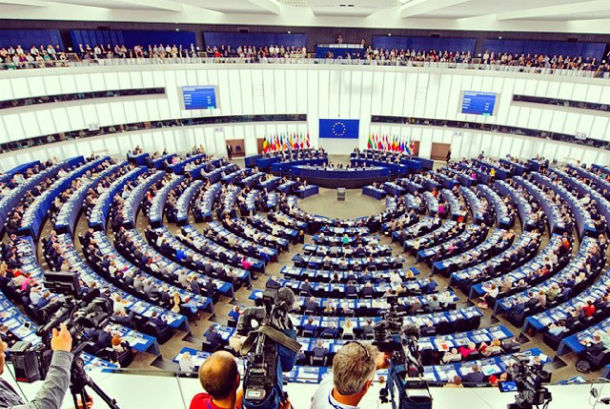 Strasbourg, France — The European Parliament Thursday called on China to respect provisions in its own constitution guaranteeing the rights of Tibetans and other Chinese citizens to freedom of speech, religious belief, and assembly, including the right to criticize or protest against state policy.
Strasbourg, France — The European Parliament Thursday called on China to respect provisions in its own constitution guaranteeing the rights of Tibetans and other Chinese citizens to freedom of speech, religious belief, and assembly, including the right to criticize or protest against state policy.
In a resolution passed by a majority of votes, members of the European parliament—the Strasbourg, France-based legislative body of the European Union's 28 member states--took particular note of the case of Tibetan shopkeeper Tashi Wangchuk, now facing a 15-year prison term for his advocacy for Tibetan language rights.
Also noted for special attention was the case of the Tibetan monk Choekyi, jailed in 2015 for celebrating the birthday of the spiritual leader of Tibet, His Holiness the Dalai Lama, with the European Parliament calling for the "immediate and unconditional" release of both men.
For the issue of Tibet, the Parliament through its urgency resolution of January 18 has reiterated "its call on the Chinese Government to engage with His Holiness the Dalai Lama and his representatives, and expresses its support for a peaceful resolution of the issue of Tibet through dialogue and negotiations with a view to granting Tibet genuine autonomy within the framework of the Chinese Constitution".
In its 28 clauses in relation to the issues of human rights with China, seven clauses deal with issues exclusively relating to Tibet. "Through this, we would like to thank the European Union and the European Parliament on their consistent stands on His Holiness the Dalai Lama and dialogue," the EP said.
The following the seven clause are reproduced by the European Parliament in Strasbourg, calling on China to respect provisions in its own constitution guaranteeing the rights of Tibetans and other Chinese citizens to freedom of speech, religious belief, and assembly, including the right to criticize or protest against state policy.
F. whereas Tashi Wangchuk, a Tibetan shopkeeper and language rights advocate, was detained on 27 January 2016 after he appeared in a New York Times video advocating the right of Tibetans to learn and study in their mother tongue; whereas in March 2016 Tashi Wangchuk was charged with 'inciting separatism' and faces up to 15 years in prison, although he told the newspaper explicitly that he was not calling for Tibetan independence;
G. Whereas in 2015 the Tibetan monk Choekyi, from Phurbu monastery in Sichuan's Seda county, was jailed for celebrating the birthday of exiled spiritual leader the Dalai Lama; whereas after being charged, Choekyi was briefly held in a prison in Kangding county in Ganzi prefecture, and was finally sent to Sichuan's Mianyang prison to serve a four-year term; whereas according to media sources, Choekyi had kidney problems, jaundice, and other health-related issues which got worse because of his detention;
6. Expresses its deep concern at the arrest and continued detention of Tashi Wangchuk, as well as his limited right to counsel, the lack of evidence against him and the irregularities in the criminal investigation; calls for the immediate and unconditional release of Tashi Wangchuk;
7. Calls on the Chinese authorities to release the Tibetan monk Choekyi immediately and unconditionally; urges the Chinese Government to allow his relatives and the lawyers of his choice to visit him and, in particular, to provide him with adequate medical care;
9. Reiterates its call on the Chinese Government to engage with His Holiness the Dalai Lama and his representatives, and expresses its support for a peaceful resolution of the issue of Tibet through dialogue and negotiations with a view to granting Tibet genuine autonomy within the framework of the Chinese Constitution";
10. Condemns, moreover, the anti-Buddhism campaigns carried out via the 'patriotic education' approach, including measures to state-manage Tibetan Buddhist Monasteries; is concerned that China's criminal law is being abused to persecute Tibetans and Buddhists, whose religious activities are equated with 'separatism'; deplores the fact that the environment for practicing Buddhism in Tibet has worsened significantly after the Tibetan protests of March 2008, with the Chinese Government adopting a more pervasive approach to 'patriotic education';
15. Recalls that it is important that the EU raises the issue of human rights violations in China, in particular the case of minorities in Tibet and Xinjiang, at every political and human rights dialogue with the Chinese authorities, including the yearly human rights dialogues, in line with its commitment to project a strong, clear and unified voice in its approach to the country; regrets, however, the lack of concrete results from the yearly EU-China human rights dialogues; further recalls that in its ongoing reform process and increasing global engagement, China has opted into the international human rights framework by signing up to a wide range of international human rights treaties; calls, therefore, for dialogue to be pursued with China in order to honour these commitments;
The Chinese Communist regime began their invasion of Tibet in 1949 with total occupation of the country occurring in 1959. Since that time, more than 1.2 million people, 20% of the nation's population of six million, have died as a direct result of China's invasion and occupation. In addition, over 99% of Tibet's six thousand religious monasteries, temples, and shrines, have been looted or decimated resulting in the destruction of hundreds of thousands of sacred scriptures and statues.


![Tibet has a rich history as a sovereign nation until the 1950s when it was invaded by China. [Photo: File]](/images/stories/Pics-2024/March/Tibet-Nation-1940s.jpg#joomlaImage://local-images/stories/Pics-2024/March/Tibet-Nation-1940s.jpg?width=1489&height=878)















